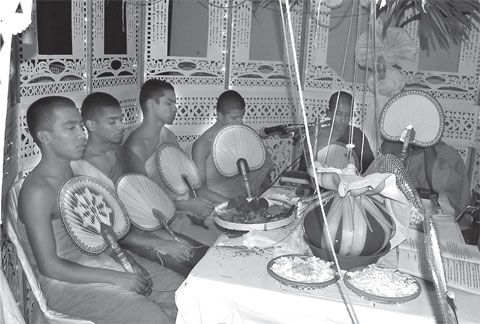Ratana Sutta, Buddha's jewel in the Dhamma
By Pemasara EPASINGHE
 Vesali was a famous and popular city of the Licchavis, during the
time of the Buddha. The city was very badly affected by dreadful
illness, drought, famine and evil spirit. The Compassionate One, through
loving kindness towards all beings chanted Ratana Sutta and The Buddha's
chief attendant Dharmabandagarika, went round the city of Vesali
chanting Ratana Sutta, sprinkling water from the alms-bowl of the
Blessed One. Ratana Sutta is titled as the ‘Discourse on the Jewels’
(Ratna). Vesali was a famous and popular city of the Licchavis, during the
time of the Buddha. The city was very badly affected by dreadful
illness, drought, famine and evil spirit. The Compassionate One, through
loving kindness towards all beings chanted Ratana Sutta and The Buddha's
chief attendant Dharmabandagarika, went round the city of Vesali
chanting Ratana Sutta, sprinkling water from the alms-bowl of the
Blessed One. Ratana Sutta is titled as the ‘Discourse on the Jewels’
(Ratna).
Ratana Sutta is also extracted from Khuddaka Nikaya, like the
Mahamangala Sutta and Karaniyametta Sutta. They are primarily the most
popular and important Suttas in the Pirith Pothvahanse.At the
commencement of Ratana Sutta, “the Enlightened One invites all
non-humans to listen to the words of the Buddha. The people believed,
these evil spirits were responsible for the deaths in the city of
Vesali.
In the second stanza which reads as follows in Ratana Sutta states:
Tasma Hi, Bhuta Nisametha Sabbe
Mettam Karota Manusiya Pajaya
Diva ca Ratto ca Haranti ye balim
Tasma hi ne Rakkhata Appamatta.
“All spirits, listen. Have loving kindness towards human beings, who
make offerings to you, throughout the day and night, showing care and
effort. Kindly protect them diligently.
From then onwards, the stanzas, numbering 17 glorify the virtues of
the Buddha; the Dhamma and the Sangha.The Ratana Sutta mentions each set
of great qualities attributed to the Triple Gem.
This is clear proof to show that the primary objective of the Buddha
was the well-being of all human beings.It is interesting to note that
the last three verses 15, 16, 17 and 18 in Ratana Sutta, pay the highest
respect and homage to the Triple Gem.
After Ven. Ananda's recital of Ratana Sutta and sprinkling of Pirith
water the famine, drought and illnesses vanished and Licchivians were
happy.
Yanidha Bhutani Samagatani
(Whatever spirits, that are assembled here)
Bhummani va yani ‘va antalikkhe
(Those of the earth and those of the Air)
Thathagatam Devamanussapujitam
(Gautama Thathagatha the Blessed One had been worshipped by gods and
men)
Buddam, Dhammam, Sangham - Namassama Suvatthi Hotu
(May we (evil spirits) worship Buddha, Dhama (Doctrine), Sangha (Order
of the Bhikkhus) and may there be happiness.
Generally, religious leaders are very much concerned with the
physical, moral and spiritual happiness and uplift of human beings.
The Buddha always valued society. Although, he belonged to royalty,
he loved all men, women and children. He was a great social being and a
friend-in-need. He was a peerless man of compassion. When the City
Vesali was affected by famine, diseases and drought, he took the
challenge to arrest the horrible, tragic disaster with his Dhamma. The
Buddha saved many lives. He possessed a golden heartfull of compassion.
He never promoted bloodshed. His main objective was to clear the path
to human beings, to attain the highest bliss of Nibbana, the state of
deathlessness and end of suffering.
The Blessed One was one of the most kind men who ever lived on the
earth. As he was full of kindness and compassion for human beings and
animals, he took immediate action when disaster struck the city of
Vesali. His magical stanzas were so powerful, the evil spirit put an end
to the great disaster. Rains came. Greenery appeared. The drought ended.
The city dwellers of Vesali after listening to Ratana Sutta, lived
happily.
In the 3rd, 4th and 5th stanzas of Ratana Sutta, The Buddha uttered
thus.
Yam Kinchi Vittam Idha va Huram va,
Saggesu va Yam Ratanam Panitam,
Na no Samam Atthi Thathagatena,
Idam Pi Buddhe Ratanam Panitam,
Etena Saccena Suvatti Hotu!
Whatever wealth here or in the other world is, or whatever excellent
jewel (Ratanam) there is in the heavens, there is none equal to the
blessed One.
In verse number 4, Khayam, Viragam, Amatam, Panitam (extinction,
dispassion, immortality, excellence) Yad Ajjhajaga Sakkyamuni Samahito
(That Nibbana, Sakyan Sage, composed, attained), Na Tena Dhammena
Sam'atthi Kinchi (There is nothing equal to that doctrine) Idampi Dhamme
Ratanam Panitam (This jewel is the doctrine) Etena Saccena Suvatthi
Hotu! (On account of this truth may there be happiness).
The stanza No. 5 is given below:
Yam Buddhasetto Parivannayi Sucim
Samadim Anantarikannam Ahu
Samadhina Tena Samo Na Vijjatu
Idam'pi Dhamme Ratanam Panitam and in the Verse No. 6 - the last two
lines
Etesu Dinnanin Mahaphlani
Idampi Sange Ratanam Panitam.
The Buddha praised the Pure Path The concentration followed. The
jewel in the Dhamma is excellent.
The verse Etesu Dinnanin - means “what are given to them bear great
fruits. This jewel in Sangha is excellent.
In Ratana Sutta, the deities of 50 many worlds, accepted the
authority of the Blessed One, and the city of Vesali which was covered
with three-fold fear arisen from illness, non-humans and famine,
disappeared quickly due to the recital of Ratana Sutta by Ven. Ananda
and it protected the city.
Research in modern medicine throws light on the nature of themind.
Reciting Pirith, daily will help the body to remain healthy.
|

